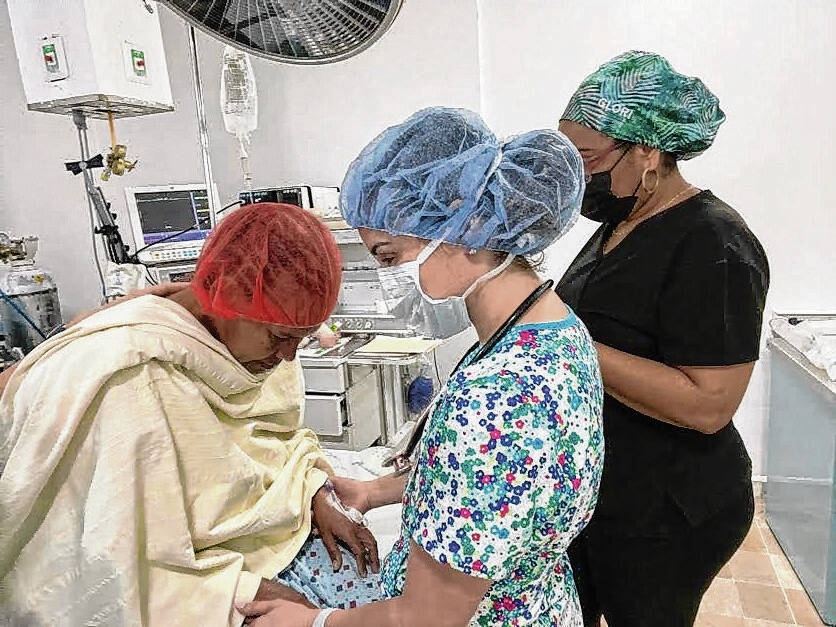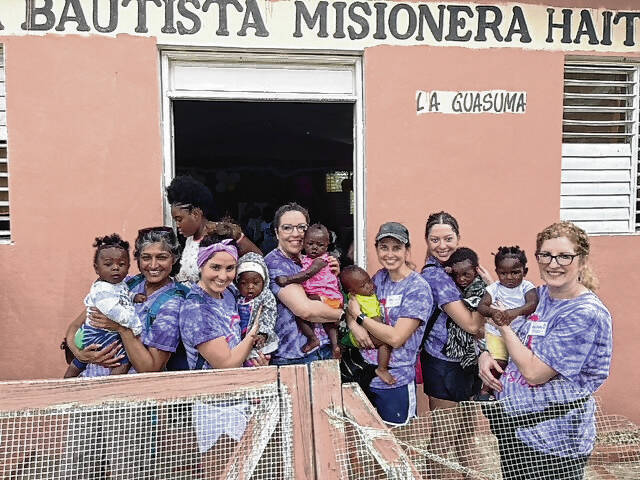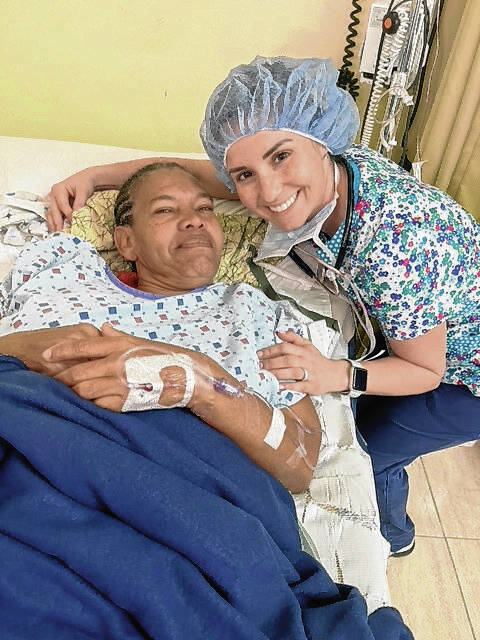Nearly 23 out of every 1,000 babies born in the Dominican Republic won’t survive past the first 28 days of life, and 107 women out of 100,000 births will die from childbirth, according to UNICEF’s data reports.
Tiffany Downing, a labor and delivery nurse at Columbus Regional Health, was just one of many health care providers across the United States who traveled to the villages of La Romana in the Dominican Republic.
While she was there, the mission was to offer health education and care to many of the women and children living in these villages outside of La Romana, known as the Bateyes.
Downing grew up in Seymour and now lives in Shelbyville with her husband and three boys. She has worked for Columbus Regional Health for 10 years and will be finishing her schooling for midwifery at Frontier Nursing University.
Downing was told about the mission work in the Dominican Republic from a midwife in Columbus who had gone on the trip before with an organization based out of Greenwood called One Mission Society.
“After reaching out to the organization, we developed a team that consisted of several different health care individuals, many inside Indiana and several outside of Indiana,” she said.
Downing said the society had already established a good relationship with a private hospital in the Dominican Republic, Good Samaritan Hospital, that has expressed a need in women’s health care.
Downing and a team 35 health care professionals, including a foreign exchange student from Ecuador, planned to set off for the Dominican Republic on Feb. 17, but a lot of groundwork had to be done before they embarked.
“We collected any supplies that we would need, education materials for the trip and developing the team to provide the care,” she said.
While the crime rate on the other side of the island in Haiti is greater, Downing said there is still a high crime rate in the Dominican Republic.
Downing said for the team to be in the city safely, they stayed in the city’s sanctuary called The Casa that was surrounded by barbed wire and had a guard posted at the gate 24 hours a day.
“We weren’t able to leave The Casa without a male from the organization to escort us,” Downing said.
She said upon first look, she felt intimidated by the surroundings, but she knew the reason they were there was worth the risk.
“The reason we were there was to spread awareness, educate others and also to spread the love of God,” she said. “To know that he is keeping us safe while we were there and while we are doing the work for these women and children helped.”
The first day in the Dominican Republic began with Downing and the team visiting the Bateyes to conduct a women’s retreat.
From there, they provided many different education materials about women’s health, including menopause, hypertension, abstinence and birth control education.
The team also was able to perform certain health care procedures, such as pelvic exams and blood pressure readings, in the Bateyes.
“If you can imagine a storage shed that someone would have behind their house, that was what their homes were,” she said. “They had dirt floors and no running water, which was very interesting being in that environment, and we provided them with a meal during the retreat.”
Later in the week, Downing and the team helped in the public hospital delivering babies along with newborn and postpartum women’s health care.
Downing and the team also worked within the private hospital, Good Samaritan, performing surgeries, such as hysterectomies and post-operative care.
The team traveled to different Bateyes within the city providing sexual and women’s health education as well as donating shoes to those residents in the Bateyes.
Also, medication, such as prenatal vitamins and aspirin, was dispersed among the people in the Bateyes that ideally would last them a year.
“Any active infections that the residents had, we would also dose them with antibiotics,” Downing said.
She said the ultimate goal of the mission trip was to educate general wellness to the women and children and how they could sustain their health after the organization left.
“You can help as many people as you can while you are there, but we want them to know how to help themselves once we are gone,” she said.
The Dominican Republic is classified as a second-world country, and Downing said within certain areas, there are not a lot of resources to go around. During her trip, she discovered a huge emphasis on the family role within these Bateyes.
“The dads are out in the fields working and away from their family quite a bit. It’s the women oftentimes who do a lot of that care for the children,” she said. “The women often lack the care for themselves, so our goal was to have healthy moms and babies that will help the community thrive.”
While conditions were not ideal, Downing said what stood out to her from her time in the Dominican Republic was the gratitude the women had for their services.
“As part of my career, delivering babies is always a special moment, but seeing the gratitude these women had was profound,” she said. “Bringing the children they had into the world and the conditions they were in, they were so grateful for every little thing we could do.”
Downing said the women wanted to learn how to take better care of themselves and their children, so when the retreat began, she said they absorbed the information like sponges.
“They trusted us so much that while they were sitting in the lectures, they let us take their babies so they could be fully present for the education that was given,” she said. “I thought it was amazing that they trusted us with their newborn babies because they wanted to learn how to better their lives.”
While the women absorbed the information and education on improving their health, Downing said she absorbed the experience, too, learning much from her trip. She returned from the trip on Feb. 25 with more knowledge and insight under her belt.
“They essentially have nothing, but you wouldn’t think that from just talking to them because they take such pride in everything that they have,” she said. “It spoke volumes about their community that they had nothing, but talking to them, you would think they have everything because of how happy they were.”
Moving forward, Downing said she not only learned new things medically but to take the attitude these women possessed and apply to the care she performs in the United States.
The connections Downing made with the women and the families in the Bateyes is something she will always remember because while she was there to take care of them, they also wanted to take care of her and the team.
“They were so easy to talk to, and they wanted to hear about our lives,” she said. “They prayed for our families back home and the United States in general. They wanted to take care of us, as well.”
Downing said one of her favorite experiences was attending a Spanish-speaking Catholic Mass during Ash Wednesday with the priest praying over the team and the work they were doing.
“I think a big part in the success of this trip was all of the groundwork that was done back home,” she said. “Many volunteers donated medication and kits for menstrual cycles that really helped us.”
After this experience, Downing said she believes the first step in improving women’s health care is starting with education and making sure women are able to see their health care providers.
“If women don’t know what they need to be doing for their health, they can’t do it,” she said. “What we find in women’s health care is that women don’t always care for themselves. Instead, they care for others first, so we want to put an emphasis on their health so they are able to take care of others.”
Downing said she is excited to return to the Dominican Republic next year to help these women, and other colleagues have expressed interest in wanting to go, too.
“It wasn’t what I was expecting going there, but I took so much from the trip,” she said. “People have asked if I thought that I really made a difference while I was there, and I do. Going forward, these women have the knowledge to better the health not just for their children but for themselves, as well.”




